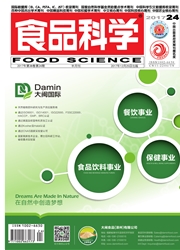

 中文摘要:
中文摘要:
本实验以人工接种黑曲霉、青霉、酵母三种真菌固态发酵和自然渥堆发酵加工而成的普洱茶为材料,对比研究其感官品质、理化品质、香气成分和微生物安全指标,并探讨其在降糖和抗癌等保健功能方面的异同。结果表明:人工接种黑曲霉、青霉和酵母三种真菌固态发酵普洱茶能保持自然渥堆发酵普洱茶的基本品质,其产品汤色、滋味、香气等感官品质优良,水浸出物和茶多酚较自然渥堆发酵的茶样(对照)优越,大肠杆菌含量低于30MPN/100g,致病菌未检出,符合云南省地方标准DB53/103—2006的安全指标要求;在活性功能方面,人工接种黑曲霉、青霉和酵母三种真菌固态发酵的普洱茶在防治胃癌和努南氏综合症上效果较好,对于降糖和减肥、免疫缺陷疾病和白血病、血液疾病的防治效果来看,则稍次于自然渥堆发酵的普洱茶。
 英文摘要:
英文摘要:
Spontaneously fermented Pu er tea and solid-state fermented Pu’er tea using artificial inoculation of fungi species, including Aspergillus niger, Penicillium and yeast were compared for differences in sensory, chemical and microbiological attributes and health care functions such as hypoglycemic effect and anticancer, and so on. Results showed that when compared with spontaneous fermentation, artificial fungus-inoculated solid-state fermentation could not only maintain the main flavor quality of spontaneouslly fermented Pu' er tea, but also result in excellent sensory characters including infusion color, taste and aroma, higher contents of water extract and tea polyphenols and lower coliform count, below 30 MPN/100 g ( no pathogenic bacteria were detected), which could satisfy the requirement for microbiological safety stipulated in the Yunnan province standard DB53/103 -- 2006. Both Pu' er tea showed significant protective effects on diabetes, obesity, immunodeficient, leukemia, stomach cancer and blood diseases and the effects of spontaneouslly fermented tea were slightly stronger.
 同期刊论文项目
同期刊论文项目
 同项目期刊论文
同项目期刊论文
 期刊信息
期刊信息
